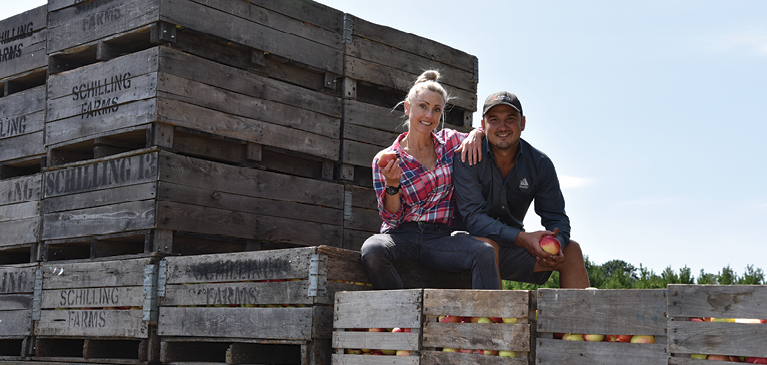
The Schilling Family uses crop insurance to offset risk in fruit production.
The southwest corner of Michigan is home to the most diverse farm production outside of California. The diversity of the crops growing creates a wider-range of opportunities for farmers, as well as risks. Growing high-value crops, like fresh tomatoes or new varieties of apples, also carries high rewards and high risks. Balancing between the two takes careful planning, a sharp focus and maybe even a bit of luck.
For the Schilling family, they embrace the tools available to help with that planning, to make the right decisions and protect their investments. The first step for them as they make tree buying decisions, is projecting 5 to 7 years into the future when the trees will mature into full production. As suppliers to the fresh apple market, as well as managing farmers market stands in the Chicago area for one of their farms, they need to be prepared to meet changing consumer demands.
On the other hand, crops like peaches, apples, cherries and tomatoes are highly dependent on the right weather at the right time. A poorly timed freeze or warm period can devastate an entire crop in a matter of days. Being prepared for these kinds of risks is also important, which is why the Schillings are proponents of using fruit and specialty crop insurance to protect against uncontrollable risks.
“We have benefited from purchasing crop insurance the past two years,” Bae Schilling says. “Last year we lost our entire crop of fresh Honeycrisp apples, and this year we lost 30 acres of peaches due to a bad winter. Having crop insurance made a big difference!”
In addition to using crop insurance, the Schillings believe it is important to self-insure against many of the risks they face with proper management and smart business decisions. Having diversified crops is one way they balance the risk, along with planting strategies and proper crop management.
Bae and her husband, Ben, are the most recent family members to join the multi-generational farm, first started in 1864. They, along with Ben’s brother, Mark, and his wife, Abby, bought the farms last year. Although Ben grew up on the farm, he and Bae (who is from Australia) each had corporate careers with global businesses, most recently in Canada and before that, Germany. Leaving their corporate careers to join the family business was a decision they did not take lightly.
“When my dad and uncle said they were wanting to retire, we knew this was our only chance to join the business,” Ben says. “It was a big decision to leave our careers and lifestyles and move here to buy and manage the farms.” While there are many differences in their day-to-day work today compared to two years ago, they rely heavily on the business and management experiences they both have to manage the farm operations.
“There is a big difference between working on the farm and running the farm,” Ben says. “It’s been like drinking from a fire hose as we try to learn everything there is to know about the farm. Thankfully, my dad and uncle have stayed on as consultants to us.”
Today, Schilling Family Farms consists of nearly 1,000 acres and is one of two farming operations the four own and operate.
The bulk of the crop is sold to grocery stores and wholesalers throughout Michigan, Indiana, Illinois and Wisconsin, as well as providing for farmers market stands and delivery routes to Chicago restaurants and breweries each week. Meeting the standards of the fresh market requires stringent compliance for quality control, food safety and crop management criteria to maintain their relationship with the buyers. The record keeping required with the compliance standards correlates well with the records needed for crop insurance. Over the years, the farm management has evolved to include high-density trees, allowing for more trees in the same amount of land. Treatment protocols, variety selection and labor management have also been revised to meet current market demands.
“There is more business behind farming than most people realize,” Bae remarks. “We spend a lot of time managing the business, the employees and the marketing of our products. With well over 100 employees at the peak of production, we have a lot of people depending on the longevity of the farm. We have to be very careful when we are weighing the risks versus the rewards of our decisions.”
Regardless of the management strategy and business experience, the first year for Ben and Bae on the farm was a trying one. From crop damage to weak markets, the Schillings felt the impact of many forces beyond their control.
“Last year was a tough year to get into farming,” Ben says. “Hopefully, the weather can’t get any worse than that – it will take a few years to judge our success.”
Although their indoctrination to the farm was a bit rocky, they are grateful for the neighbors and others who have been welcoming and supportive of their new adventure, including working with GreenStone Crop Insurance Specialists.
“GreenStone probably knows this farm better than I do,” Bae says. “They have worked with the family and in this area so long; they know a lot about what we are hoping to do. GreenStone has been a great resource of information to us, and they are all good people with great customer service. They just get it!”
To view the article in the online 2019 Fall Partners Magazine, click here.


